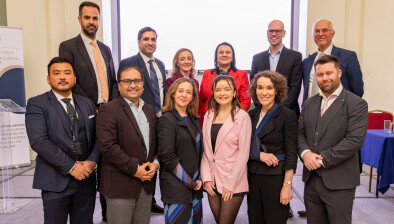Supreme Court: Questions concerning interpretation of Citizenship Directive referred to CJEU

The Supreme Court has referred two questions concerning the interpretation of Article 35 of the Citizenship Directive to the CJEU in a case involving a fraudulent application for a permanent residence card.

About this case:
- Citation:[2025] IESC 29
- Judgment:
- Court:Supreme Court
- Judge:Mr Justice Donal O'Donnell
Delivering judgment for the Supreme Court, Chief Justice Donal O’Donnell explained that “questions of fraud are particularly significant in immigration decisions of this kind. Moreover, given that the Court of Justice has not heretofore had the opportunity of pronouncing on the interpretation of Article 35 of the Citizenship Directive, it is important that this matter be authoritatively resolved.”
Background
The appellant, a Pakistani national, arrived in the State on a student visa in 2004. On 10 January 2011, he married a Hungarian national and obtained a residence card in July 2011.
On 20 May 2016, the appellant applied for a permanent residence card on the basis that, for the purposes of Article 16(2) of Directive 2004/38/EC (the Citizenship Directive), he was the third country spouse of a member state citizen exercising their free movement rights who “legally resided” with that Union citizen and would be entitled to permanent residence in the host state after a stay of five years.
He furnished the respondent with an invoice book to show that his wife had been working as a self-employed childminder up to the date of application, which was not true in circumstances where she had apparently left the state in January 2016.
Having granted a permanent residence card on 14 July 2016, the respondent subsequently notified the appellant of his opinion that the invoices were fraudulent and that his marriage may have been one of convenience. That conclusion was affirmed by a first instance decision on 19 November 2018.
The appellant applied for review of the decision in accordance with the European Communities (Free Movement of Persons) Regulations 2015 (S.I. No. 548 of 2015). The decision was upheld on the basis that it had not been established that the appellant’s wife had been engaged in child-minding in 2016 and that most of the invoices submitted were fraudulent and known by the appellant to be false and misleading, leading to the conclusion that the appellant’s wife had not been exercising her free movement rights for the full five-year period contemplated by the Directive.
The High Court and Court of Appeal
The appellant issued judicial review proceedings, with the main legal issue arising being whether the respondent, having concluded that the appellant had obtained his permanent right of residence by fraud, was nevertheless obliged to conduct an assessment of the impact of the revocation of his right of residence by reference to a range of personal factors such as his length of residence in the State prior to making that revocation decision.
The appellant also challenged the adequacy of the reasons provided by the respondent.
The High Court found against the appellant on the issue of reasons, but concluded that the minister was required by Article 24 of the Directive and by extension, Article 27 of the 2015 Regulations, to conduct an individualised proportionality assessment.
The Court of Appeal agreed with the High Court on the adequacy of reasons issue, but found that it erred in holding that Article 35 required an individualised assessment on proportionality grounds, noting its agreement with the respondent’s contention that Article 35 did not require a standalone proportionality assessment to be conducted in every case where a decision is made in response to fraudulent activity leading to the deceptive acquisition of a right pursuant to the Directive, rather it required that such a decision be proportionate to the individual case.
The appellant was granted leave to appeal to the Supreme Court on the single issue of the proper interpretation of Article 34 of the Citizenship Directive in cases of fraud.
Supreme Court
The Chief Justice explained that the case would turn on the interpretation of Article 35 of the Directive, which states that member states may adopt necessary measures to refuse, terminate or withdraw any right conferred by this Directive in the case of abuse of rights or fraud, such as marriages of convenience, and that any such measure shall be proportionate and subject to the procedural safeguards provided for in Articles 30 and 31 of the Directive.
The court also pointed out that those provisions fell to be construed by reference to Articles 27 and 28 of the Directive, which concern the restriction of the freedom of movement on grounds of public policy and public security and the protections against expulsion on those grounds.
In this regard, the Chief Justice highlighted that pursuant to Article 27, all measures restricting freedom of movement and residence taken on grounds of public policy or public security must comply with the “principle of proportionality” and must be focussed on the relationship between the conduct of the individual and the impugned measure pursuant.
By contrast, the court considered that pursuant to Article 28, “where the contested measure is expulsion on grounds of public policy or public security, factors such as how long the person is in the State concerned, their age etc., must be considered… This requirement is imposed without any reference of any kind to the word ‘proportionality’. This is because it seems to be concerned with a different kind of assessment, namely, the impact on the individual in question.”
Having considered general principle and the jurisprudence of the European Court of Justice and the courts of England and Wales, the Supreme Court reasoned that “it would be strange if a person who obtained a valuable entitlement by reason of fraud or abuse of rights should nonetheless become entitled to retain that right by reason of factors such as lapse of time or integration into the community”.
The court continued: “On this approach the reference to ‘proportionate’ measures in Article 35 is a reference to proportionality between the decision and the fraud so that the fraud is sufficiently serious and related to the acquisition of rights such that the revocation of the permanent residence is justified.”
Finding that in a case like the appellant’s, the possible impact of a decision to revoke on the individual who engaged in the fraud is immaterial and instead what matters, and what is required by Article 35, is that the revocation decision is proportionate to the fraud, the Chief Justice opined: “In the present case it clearly is.”
However, the court acknowledged that this interpretation, which it considered to be correct, was perhaps not the only possible interpretation and that it could be said that the language of Article 35 envisages an individual assessment as to the consequences of the revocation decision, “not least with its reference back to the procedural safeguards of Article 30 and Article 31”.
In those circumstances, and in light of its status as a court of last resort and the fact that the Court of Justice of the European Union (CJEU) had not yet had the opportunity to pronounce on the interpretation of Article 35 of the Citizenship Directive, the Supreme Court referred the following questions to the CJEU pursuant to Article 267 of the Treaty on the Functioning of the European Union:
“Where it has been established in the course of a review decision in which the applicant has participated that an applicant who sought and obtained permanent residence in the host State in accordance with Article 16 of Directive 2004/38/EC has supplied materially misleading and fraudulent documentation in support of that application and which has materially affected the decision to grant such permanent residence, may that host State revoke the decision to grant permanent residence on that ground alone?
“Or does Article 35 of Directive 2004/38/EC require that the host State conduct an individualised proportionality assessment regarding the potential impact of any decision to revoke the permanent residence on the applicant in question?”
Conclusion
Accordingly, the Supreme Court stayed the proceedings pending the decision of the CJEU.
Imran v Minister for Justice [2025] IESC 29










